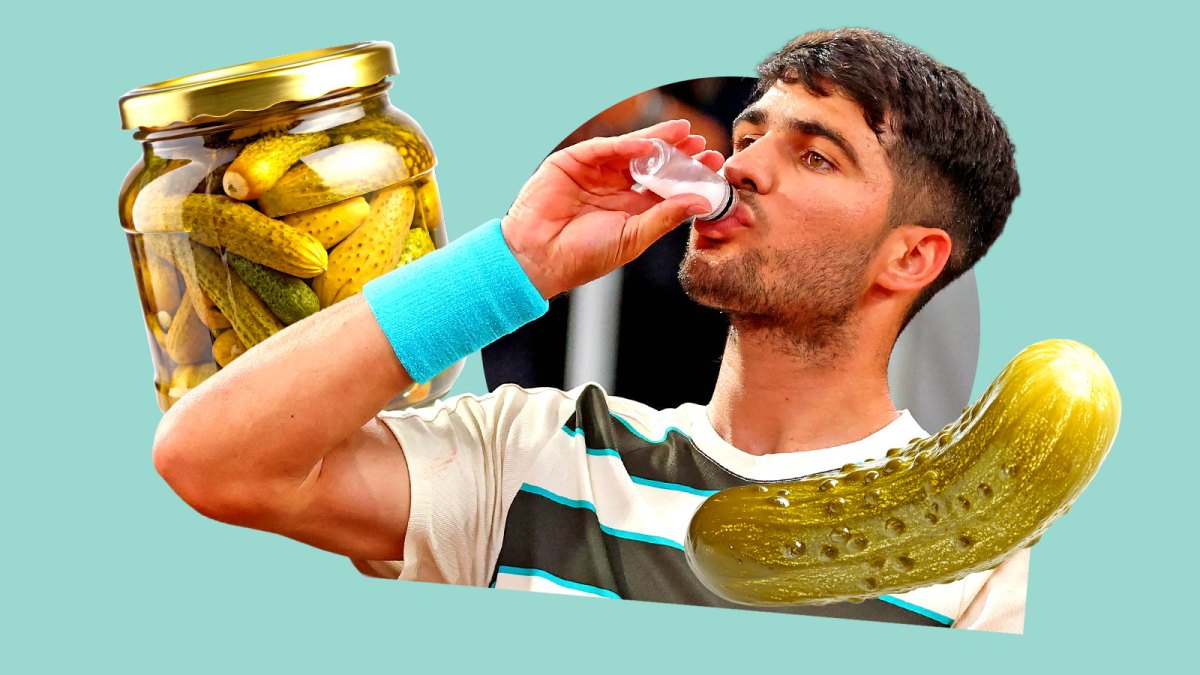Amid his fierce ball-striking and breathtaking athleticism, Carlos Alcaraz’s secret weapon may be rather more unappetising.
The Spaniard came back from two sets down to defeat Jannik Sinner in the French Open final on Sunday, and his recovery may have been fuelled by the sour taste of pickle juice. Alcaraz drank it during his victory in Paris, and has also been spotted consuming the juice during Wimbledon.
He is not alone. Fellow tennis players such as Frances Tiafoe have extolled pickle juice’s benefits, as has the England footballer Kieran Trippier.

Newcastle’s Trippier also utilises pickle juice
MARTIN RICKETT/PA
Pickle juice may prevent muscle cramps. The fluid contains sodium and potassium, meaning it can replenish the electrolytes lost via sweat. Since cramps are perhaps more likely to occur when the body is experiencing an imbalance in electrolytes caused by sweating, this hydrating helps to keep muscles loose.
Alcaraz’s strategy appears sound, because tennis players sweat a lot. “Tennis is often played in the heat and over long periods — like we saw on Sunday — and so players do lose a lot of electrolytes,” Karl Cooke, former sports science manager of the LTA, says. “Loss of electrolytes is associated — although not proven — to be linked to cramps. So if you track the careers of athletes that have cramps, part of the issue is they don’t always replace the electrolytes.”
However, sodium and potassium are not found exclusively in pickle juice, so why is Alcaraz subjecting himself to the briny beverage rather than a traditional, tasty sports drink? He could be following the belief that the acetic acid in pickle juice is pivotal.
The acid, which gives vinegar its powerful odour, potentially helps relieve cramp instantly by stimulating nerve receptors in the mouth, which create a neurological reflex that makes the muscles relax within seconds. Pickle juice, then, could offer an instant cure for a cramping tennis player during a change of ends.
Yet although this concept has been supported through an article published in the Journal of Medicine and Science in Sports and Exercise in 2010, many experts are unconvinced. Cooke is among them.
“My experience with top British players was that with a relatively high concentration of electrolytes in their sports drink they generally got the issue under control,” he says.
Still, the acetic acid theory appears logical, and Alcaraz’s decision is sure to be calculated. Like all top players, the world No2 has a strong performance team fine-tuning his body.
Their work may include analysing the unique chemical make-up of Alcaraz’s sweat, which can be performed by applying a patch to the skin and sending the solution to a lab.
“I have no idea what Carlos does in terms of nutrition, but normally an athlete would be testing their electrolyte losses and aiming to create a drink formulation that replaces that,” Cooke says.
“If you were to test across the French Open you’d see a wide variety in the amount of electrolytes. I would not advocate for a one-size-fits-all approach.”
With the stakes so high and the risks minimal besides the nasty taste, if Alcaraz thinks pickle juice will benefit him, he would be foolish not to force it down.
“You leave no stone unturned and that is fair, because these are once-in-a-lifetime moments,” Cooke says.
